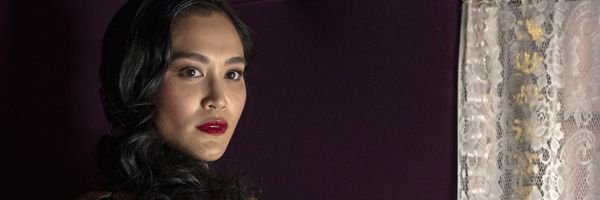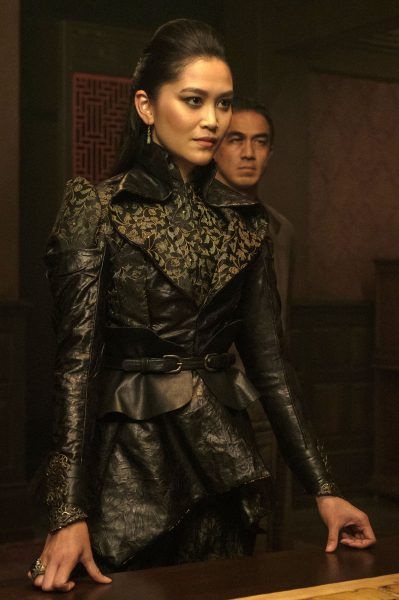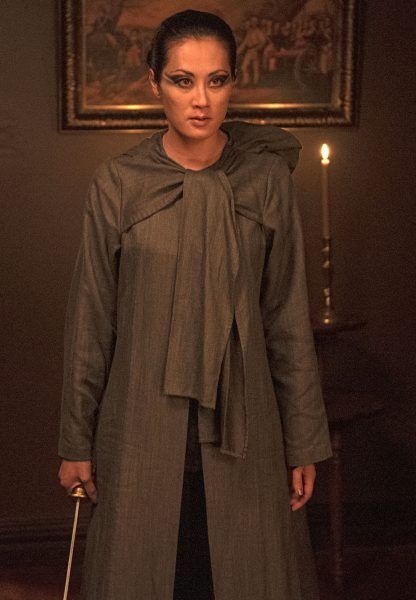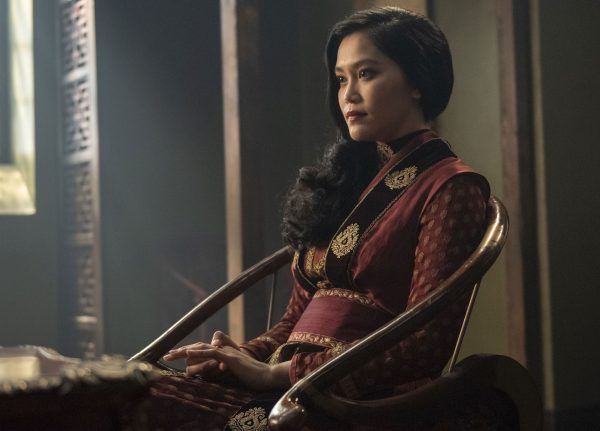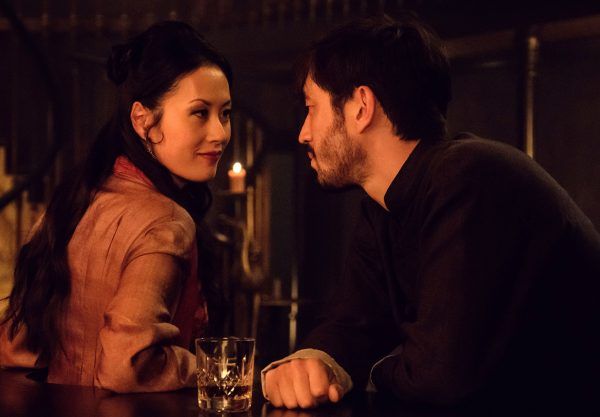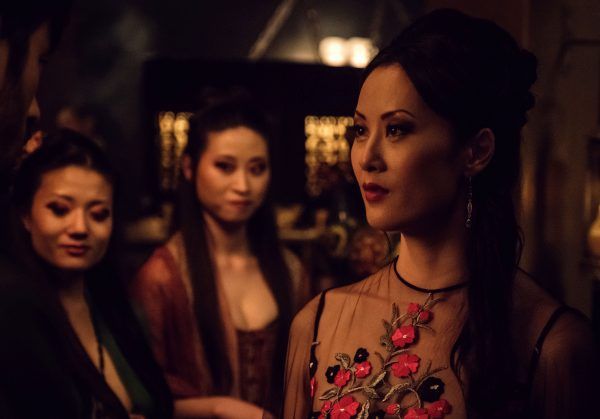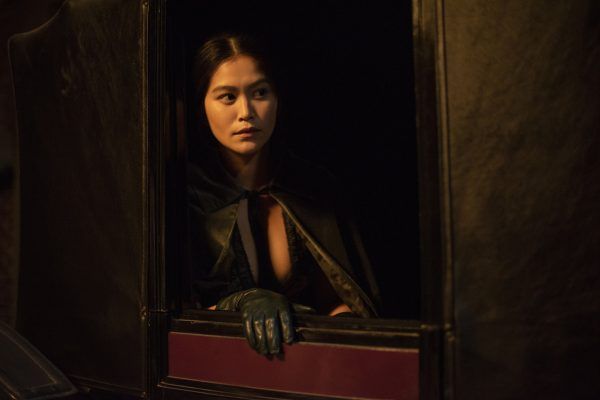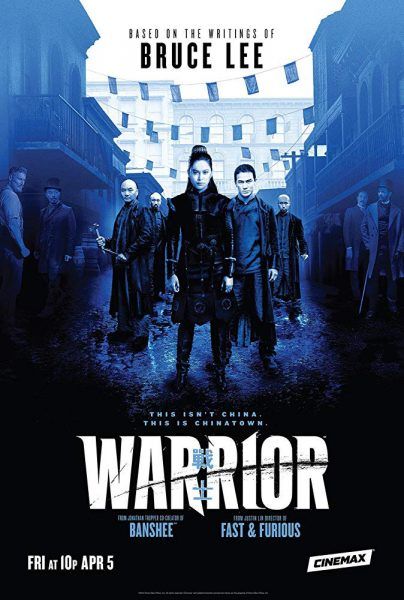From executive producers Shannon Lee and Justin Lin, and showrunner Jonathan Tropper (Banshee), the 10-episode Cinemax action-packed drama series Warrior, based on writings from martial arts legend Bruce Lee and set during the brutal Tong Wars of San Francisco’s Chinatown in the second half of the 19th century, follows Ah Sahm (Andrew Koji), a young man who’s left China behind for San Francisco under mysterious circumstances, only to realize just how challenging that can be. Now that he’s become a hatchet man for one of Chinatown’s most powerful Chinese organized crime families, violence is erupting all around him and he must decide which boundaries are worth crossing and which might be too dangerous to survive.
One of the most fascinating aspects of Warrior is the role that women play in the world that’s being created. Collider spoke with co-stars Dianne Doan (who plays Mai Ling, the sister of Ah Sahm and a ruthless woman who has achieved a position of power in one of the Tongs) and Olivia Cheng (who plays savvy brothel madam, Ah Toy), who talked about what drew them to this material, researching the real history of the time period, the weight and responsibility of telling a story like this based on the writings of Bruce Lee, what they’ve grown to appreciate about their characters, getting to work on such incredible sets and wear such amazing costumes, and what they’d still like to dig deeper into with their characters, in the future.
Collider: I absolutely love this show, and I love that the women on this show are so bad-ass. Because Warrior really is unlike anything else that’s on TV, when you were first told about this series, how much did they tell you about what it would be and who the character would become, and what was your reaction?
DIANNE DOAN: If I’m being completely honest, I hadn’t heard of the show when they approached my manager about an audition. At first, there was not much in the breakdown. My character breakdown was, “Female lead, and sister to Ah Sam,” but I didn’t know who Ah Sam was. I said no to the project, at first, because I was hesitant. At the bottom of the audition, it said, “Must be comfortable with nudity or simulated sex,” and usually, whenever I see that, I just pass on the audition because it’s a big indication, especially for Asian women, that maybe I’ll just be the girlfriend, or a character that may not necessarily have a strong arc in the show. I passed on it and I was okay with that. I carried on with my day, but something in me tugged and was like, “Maybe I should look up what Warrior is,” which I never do. Normally, when I pass on something, I let it go and move on, but I decided to Google, “Warrior for Cinemax,” and as soon as I hit search, it was Bruce Lee’s story, with Shannon Lee and Justin Lin attached, and how it found its home at Cinemax with Jonathan Tropper. I was floored. You’re right, there hasn’t been anything like it on television, so of course, I went crawling back to my manager and said, “Let’s just try to get all of the information,” because we had so little. That’s when I got the chance to sit down with Jonathan on Skype, and I asked him all of my questions like, what is Mai Ling’s arc? Who is she, in the story? Where do you see her going? Of course, I wanted to hear about the actual show, itself, and they were able to send me the pilot. It would have been silly not to even try to be a part of such a great time in television, especially for representation.
OLIVIA CHENG: I had heard about a project that was based on Bruce Lee’s concept, from over 40 years ago. I had heard that it was something that the HBO/Cinemax team was doing, which was very intriguing, given their caliber of content. And I had heard that it was something that Justin Lin, and maybe more importantly, Shannon Lee was behind. Any time that you have the caretaker of an icon’s legacy giving the stamp of approval to a project, it certainly makes you feel a little better, as an artist, coming on board to collaborate. At the time when I first read about Ah Toy, because they give you very little information, as an actor, and you literally only get one or two lines, my first reaction was, “Is this a role that I want to take on?” There were aspects about the description of Ah Toy that scared me, to tell you the truth. At the same time, I was really intrigued because I’ve been a bit of an Asian American history buff, since high school, and I already knew the real story of the real Ah Toy, so I was really intrigued about the idea of creating a fictionalized version of who she was.
Olivia, what were the things about her and about taking on this role that made you the most nervous?
CHENG: I think what made me the most nervous about taking on Ah Toy was the fact that she’s a female character who’s a madam and a brothel owner, and it’s always a fine line, as an Asian female actress, when you’re given a role that historically has been a real source of pain for so many in the Asian community. There are so many actresses who have a real valid concern because, traditionally, the Asian female community has been portrayed as these one-dimensional prostitutes with no emotional arc. So, I definitely had some fears about, “Well, who is this woman going to be?” I have no problem playing any kind of character, with whatever kind of occupation. My interest is more, who are they as a human being, what colors are we going to be able to portray, and what kind of complex storylines will the character get a chance to handle?
Diane, because these characters are so layered, and there are so many secrets that they’re all hiding, how much did you actually get to know, ahead of time?
DOAN: To be honest, that’s always the gamble. You never really know what you’re getting yourself into until you’re on the show already. It’s so rare that you get to sit down with the showrunner himself, or the creator, and just ask questions. The whole process of getting onto Warrior has been not normal. It’s just been such a blessing.
Jonathan Tropper seems like somebody who has a very clear vision for what he’s doing. Did it feel the same way for you?
DOAN: He knows exactly what he wants, and he’s so open to collaboration and our ideas. If something doesn’t sit right with us, we can always go to him and voice our concerns, or our views about the character. It’s a very collaborative effort, but at the same time, he knows where he sees the season going and what our character arcs are. All of the writers are very talented.
Olivia, how deeply did you research any of this?
CHENG: Because Asian American history is something that I have read about for so long, it’s not like I had to start from square one for this project. As soon as I saw her name, I was like, “Oh, this is a San Francisco Chinatown project. I wonder if this is a re-imagining of the real Ah Toy.” When I realized that it was, I went back and looked up everything I could on Ah Toy, and there’s nothing from her point of view. There’s just the urban legend that male historians have put together about her. And what little I was able to get from that, I can certainly understand why she captured the imagination of Jonathan Tropper and made it into our show, with our fictionalized version of her. I certainly revisited some Asian American history, but since I understood so much of it, I didn’t have to research to understand those feelings of being in a place where you’re not wanted, where people are hostile, where people see you as less than human because something about your appearance is not okay for them. Those are themes that I’ve experienced, in my own life. Sometimes that’s not really something you need to delve into a book for. You can draw on experiences you’ve had in your life, to lend to a character. With that said, there are a bunch of Asians in this cast, so there were a lot of history books being passed around amongst us.
When you find out that this series comes from the writings of Bruce Lee, and that it’s taken this nearly 50-year journey to finally reach the screen, does that add an extra weight and responsibility to everything?
DOAN: Of course! It’s this pressure, but at the same time, we’re all just honored to be a part of it and to be bringing it to life. For it to take 50 years, you wonder why, but at the same time, I don’t think it would’ve been made at any other time than now. Now is when we see this shift in representation and diversity in the industry. I don’t know if, a few years ago, this would’ve been green lit or as accepted as it is today. There’s always this pressure to carry on his legacy, but at the same time, how amazing is it to be a part of that legacy.
All of the characters on this show have so many layers to them. What have you grown to appreciate about your character, the longer that you’ve played her and gotten to know more about who she is?
CHENG: That’s a great question. What I appreciate the most about playing Ah Toy is that she’s a woman who understands that life is not always easy, and it’s full of complexities that you just have to find a way to deal with. I appreciate being able to play someone whose power is something that she doesn’t have to prove to anyone. Getting to play those colors, I feel like I’m learning a lot from her.
DOAN: Mai Ling is someone who’s going to do whatever it takes to survive. I hope that doesn’t come off as too ruthless. There’s this fine line of playing her like the villain, but deep down, she’s been hurt so much and left in such a vulnerable position. We haven’t touched much on it, but her backstory, being married off to a war lord and the nightmares she had to have gone through to even get to Chinatown, telling herself that she would not be a prostitute in the brothel, and working her way from the bottom of the ladder, all the way up to the top of the Tong, it’s this need for survival and power that she never gives up. In that regard, I have so much respect for her, as a person, making it in a very heavily male-dominant world. I really do love that aspect that we’re playing. And then, there’s that vulnerable side, with her brother there, and that relationship between Mai Ling and Ah Sahm. You get to see a small glimpse of that softer side of her, and that loving side. As you said, it’s a very complex, layered character.
One of the coolest things about the show is that these characters are all the hero of their own story, but they’re also the bad guy to someone else, and Mai Ling is clearly a woman who’s not opposed to killing to get what she wants, or to having people end up dead. Diane, if Mai Ling didn’t have to be who she’s become, and if the circumstances were different, who do you think she would be?
DOAN: I don’t know if she ever would’ve made it out of China. She would’ve still been married to the war lord. I think it’s just her need to get out that caused her to flee to America because, even getting there, history tells us that the only women that would get off a boat or be accepted to America were ones that were with their merchant husbands. How she must have gotten into Chinatown is a mystery, but she’s must have been through so much. I think without that need to escape, she’d still be in China, or even possibly dead. The interesting thing is that the three women in this show are the bosses of their own world, with Mai Ling as the head of the Tong, or opium, and Ah Toy owns sex, and then Penelope Blake is married to the most powerful man in Chinatown, but she has the business to her name. I really love how the three of us don’t play the damsels in distress. I don’t know when it will happen, but I would love to see the three of us in one room, and see what comes of that.
Olivia, what do you most enjoy about getting to explore the complexity of this character?
CHENG: I feel like your question really reflects what I would say, as an answer. You hit the nail right on the head. What I really love about this show is that we’re all anti-heroes. We’re all flawed and complex. We have noble intentions, in one arena of our lives, and then we do something that can be a complete contradiction to what our best intentions are, in another area of our lives, and because we’re being given a chance to be these walking contradictions, as these flawed and complex human beings, that’s what the audience connects with. If you really take a long hard look at human beings, ourselves included, everyone has got a mask, but underneath the mask, everyone is full of hypocrisies, contradictions, complexities, and behaviors that are motivated by experiences and histories. I feel like we have a real opportunity on Warrior to play these incredibly complicated and complex human beings.
Diane, one of the things that I love most about the dynamic between Mai Ling and Ah Sahm is that you can sense how much history is between them. What do you most enjoy about that relationship? Do you see them as family, or are they enemies to each other?
DOAN: There’s so much conflict in the vibe there. Deep down, Ah Sahm is always going to be blood. Right now, he’s posing as the conflict in her world, and he continues to be a pain in the ass that’s causing her trouble. Mai Ling has to hold onto the fact that he’s the only blood she has left and, as much as she wants to survive, she also wants to be accepted. To have her brother there definitely changes the dynamic. She saves him, throughout Season 1. We always see her giving him chances to get out of Chinatown to save him because she knows that he’s not going to survive, if he stays, which is not something that she should be doing, if her ultimate goal is to rise in power. She could’ve had him killed, but the dilemma, deep down inside of her is that he’s her brother and she doesn’t have anyone else.
How have you found the experience of working with Andrew Koji?
DOAN: I love working with Andrew. It’s the most fun time that we have on set because all we do is bicker like brother and sister. When we filmed Episode 4 in the carriage, that was one of my favorite scenes in Season 1. It’s a simple scene. It’s the two of us chatting in a carriage about her knowing about his relationship with Penny. But those lines and how quickly we come back at each other, it’s just brother-sister banter. There’s an ease that comes out of it, where you see that they’re clearly brother and sister. We always get in trouble on set because we’re talking the whole time. This season, there were a lot of emotional scenes between him and I. Episode 7 was a good episode for the two of us and just how much we’d do for each other when the boundaries are pushed.
Even if the show isn’t 100% accurate, it feels so real. What’s it like to find yourself in South Africa, standing in for San Francisco in the 1800s, and to get to wear these costumes? Does it just blow your mind, when you’re surrounded by all that?
CHENG: It’s a huge blessing. I am so incredibly grateful to be on a show that resonates for me, culturally and artistically, and to have material that challenges me, in the best ways. I’m so proud of the work that I’ve put into this show, and I’m so in awe of the work that I’ve seen my co-stars put into the show. It’s not lost on me that we’re recreating a part of Asian American history, in a country that’s captured the imagination of the world, having watched South Africa move through apartheid, and claim a new space in history and human rights. So, it’s a really magical combination of reality colliding with imagination and fantasy. Even meeting the Asian extras and hearing their stories, there are echoes of Asian American history in South Africa. It’s really meaningful, even getting to see our Asian extras step into this world and see some part of the Asian immigrant story being played out in their backyard, and watching it resonate for them. That’s why I’m so proud of this show. There are scenes that we’re playing that really resonate for audiences, no matter what your cultural and ethnic background are.
DOAN: It can be harder to play period dramas because you have to wonder how people acted and what the landscape was. But to be honest, because of how incredible these sets are built, we have our own four or five street radius of San Francisco’s Chinatown, with the Irish quarters and the streets of San Francisco. Playing with that, it immerses yourself in it. You can’t not be brought back into that time. The costumes for Ah Toy and Mai Ling aren’t period appropriate. For Ah Toy, they’re haute couture fashion gowns and her hair is done up. With Mai Ling, we went with more of a classical Chinese garment look, but by the end of the season, there was this dynamic shift, in both her arc and in her wardrobe. You’re just brought back in time. It makes it so much easier to drop into character because of it, and because of where we are. And when we shoot in Chinatown, there are hundreds of background artists that are dressed up completely and there are horse drawn carriages. It’s amazing. They’ve done a phenomenal job with everything.
Olivia, what’s it like to get into the wardrobe of Ah Toy? Does it change how you carry yourself, when you’re dressed the way that your character dresses?
CHENG: Absolutely! My outfits are only going to get crazier and crazier, in the best ways possible. If you really track Ah Toy’s fashions, you really do see her look evolving, from the first episode to the last episode, and to Season 2. The costumes I was put into were really there to stretch the boundaries of fashion, and they definitely affected the way I walk because I have these huge trains, I’m in these high heels, and I’m in this incredible couture make-up and hair. You can’t clomp around in those outfits. It does inform how I walk, so that I don’t fall over in those dresses, or how I can move my hands because of jewelry, or how I can feel the weight of a hairstyle piled on top of my head. It certainly informs the physicalities of Ah Toy, for me. One of the things that I love about this show is that pulp aspect we put to it. The Hop Wei Tong guys at look GQ, circa 1878. They look so slick, in their vests and their button-up shirts and their black trousers. I love that the fashion is really putting our men forward as sex symbols. I’m really proud that this show is really re-masculinating the Asian male in mass media because we’re examining a period in American history where the Asian male was institutionally and historically emasculated in media. I love that our fashion is pushing against a lot of that history.
Diane, as your character started making some of the definite moves for power, was there anything that she did, over the season, that most surprised you?
DOAN: What happened in Episode 7 was the biggest shocker for me. It was such a challenging episode. The ball just keeps rolling faster and faster, and she’s just in over her head, forced to make these decisions that I don’t think she was ready for. Some jaws dropped, when we got the episode and read it. There were so many questions in the air, and that definitely threw me, on figuring out how to prepare to even shoot those scenes. There were moments in Episodes 7 where I was like, “Is this too far? Why does she have to do this?” It’s always fun to be the character that the audience hates, but deep down, I don’t want anyone to hate her. I hope they understand why she’s doing this. Who is this person that we have to deal with now is a common theme, even going into Season 2.
Since we know that you’ve already gotten the Season 2 order, what would you still like to dig deeper into, when it comes to your character?
DOAN: I would love to show the audience a little glimpse of where Mai Ling came from and what happened to her, to answer the question of, why is it that she’s so ruthless? As the actor playing Mai Ling, I have all of that back story. I know my intentions, but it’s not always put across for the audience to have seen and fully understand her. It would just be such an amazing opportunity for the audience to get a deeper understanding. I don’t want it to ever come across as too much or too far. In Season 2, we’ll get deeper into character development. Season 1 had so much set-up because there are so many characters with so much story to tell. In Season 2, we’re just digging deeper into characters and tightening up those loose ends that we leave within Chinatown and the Tongs.
CHENG: I’m really excited for the fans to start to see what’s underneath the incredibly cultivated mask of Ah Toy. We start to plant a lot of seeds, in the remaining episodes of Season 1, that give you hints that there is so much more to Ah Toy than she presents to the public. As the audience members privy to her private moments onscreen, we start to see glimpses of that. And then, in Season 2, those glimpses ramp up into some serious fuck-uppery, to take a term from our show. You are going to see the fragility, the vulnerability, and the humanity underneath that protective armor, in a way that I genuinely hope surprises and affects people.
All of these characters are so bad-ass, including the women, and the character dynamics are so interesting, that I’m really glad you’re getting a second season.
CHENG: I feel like Season 1 is the set up. In Season 1, we’re watching Ah Sahm find his way around this new world. He’s very much a classic fish out of water, in that way, and as the audience, we see the world through his eyes. In Season 2, you really start to get into these more complicated interactions between all of us. I really tip my hat to the writers. I think they just pushed things to the max, and it’s really going to pay off for fans. With the renewal, basically what Cinemax did was give the characters more space to live, and the writers more opportunities to infuse more aspects of life into all of the characters. They’ve really taken that opportunity and run with it, which is nice because, as actors, we get the opportunity to take that material and run with it, and then pass that on to people who are watching. I’m just really excited for people to see what’s coming.
Warrior airs on Friday nights on Cinemax.

